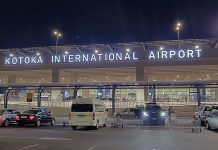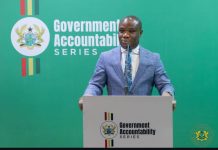Foreign Secretary Dominic Raab urged China to “step back from the brink” after reports it passed a controversial national security law in Hong Kong.
He said the new powers, which could restrict protests and freedom of speech, threatened the city’s autonomy.
Its last British governor, Lord Patten, said the move had breached agreements made with the UK before Hong Kong was handed over in 1997.
Those agreements guaranteed certain rights for 50 years.
“The success of Hong Kong, the entrepreneurial spirit, the vibrancy, the economic success, has been built on its autonomy in the one country, two systems paradigm,” Mr Raab told the House of Commons.
“That clearly is at threat, if China as we now fear, has enacted the legislation and our worst fears in terms of the substantive detail are borne out.”
He added: “We would urge China to step back from the brink, respect the rights of the people of Hong Kong and frankly live up to its international obligations through the joint declaration and to the international community.”
Labour’s shadow foreign secretary Lisa Nandy said Mr Raab “must not waver” over his responsibilities to the people of Hong Kong.
Mr Raab said that “we fully intend to see through” plans to change visa rules to offer millions of people in Hong Kong a way to acquire UK citizenship.
Prime Minister Boris Johnson said he was “deeply concerned” about the law, but added he would not be drawn into “sinophobia” over other issues, such as the decision to allow Huawei equipment to be used in Britain’s 5G mobile data network.
READ ALSO: China passes controversial security law to smother Hong Kong’s autonomy
Hong Kong’s chief executive Carrie Lam said the new law would fill gaps in the territory’s national security legislation and would only affect a small number of people.
But with the city having seen increasing unrest and a widening pro-democracy movement, there are fears the law criminalising secession, subversion and collusion with foreign forces could mark the end of its freedoms.
Civil liberties, including the right to protest, freedom of speech and the independence of the judiciary, were enshrined in the Basic Law, Hong Kong’s mini-constitution that came into effect with the end of British control in 1997.
The 50-year agreement is said to implement a “one country, two systems” principle, because it offers Hong Kong rights and freedoms that do not exist in mainland China.
Lord Patten, who oversaw the handover as governor, said the security law put an end to this principle and was a flagrant breach of the agreement between Britain and China.
The UK has previously said it will change its immigration rules and offer millions of people in Hong Kong a way of acquiring UK citizenship if the law is passed.
Prime Minister Boris Johnson said he would give extra rights to British National (Overseas) passport holders. Around 350,000 people in Hong Kong have this passport and a further 2.6m are eligible.
They would be allowed visa-free travel to the UK for 12 months, along with the right to work, which “could place them on a route to citizenship,” Mr Johnson said.
BBC





















































![[FREE FREE MONEY] Predict and Win a Guaranteed GH¢200 From Us EVERY WEEK](https://wordpress.ghanatalksradio.com/wp-content/uploads/2022/02/Predict-and-Win-Final-09-03-2021-218x150.jpg)
![[Predict & Win – 8th/Oct.] WIN A Guaranteed ¢200 From Us This Week](https://wordpress.ghanatalksradio.com/wp-content/uploads/2021/10/maxresdefault-16-218x150.jpg)
![[Predict & Win – 2nd] WIN A Guaranteed ¢200 From Us This Week](https://wordpress.ghanatalksradio.com/wp-content/uploads/2021/09/maxresdefault-50-218x150.jpg)
![[Predict & Win – 25th] WIN A Guaranteed ¢200 From Us This Week](https://wordpress.ghanatalksradio.com/wp-content/uploads/2021/09/maxresdefault-36-218x150.jpg)
![[Predict & Win – 18th] WIN A Guaranteed ¢200 From Us This Week](https://wordpress.ghanatalksradio.com/wp-content/uploads/2021/09/maxresdefault-23-218x150.jpg)








![[National cathedral] See full list of churches that have contributed since 2018](https://wordpress.ghanatalksradio.com/wp-content/uploads/2020/09/Ghana-National-Cathedral-GhanaTalksRadio-100x70.jpg)



